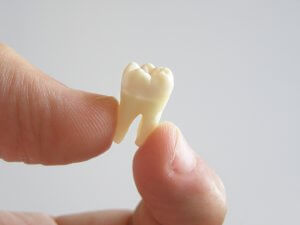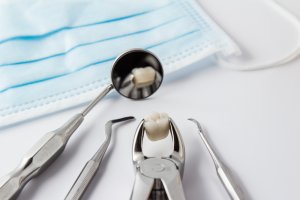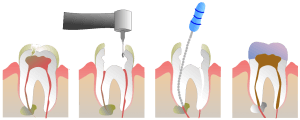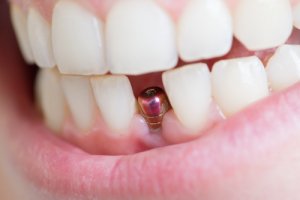Nobody looks forward to hearing that they need a tooth extraction, but the majority of Americans undergo the procedure at some point in their lives for the benefit of their oral health.
There are a number of reasons why a dentist may recommend having a tooth removed:
- Tooth infection or severe decay
- Periodontal (gum) disease
- Irreparable damage from trauma
- Impaction (in the case of wisdom teeth)
- To make space for tooth realignment with an orthodontic appliance
- To allow dentures or implants to be fitted
In this guide, we’ll explain what to expect when you have a tooth taken out. Many people worry about tooth extraction pain, but the good news is that modern anesthetic techniques make it as comfortable as possible. You’ll feel a bit sore afterwards, but we have some advice for aiding healing and recovery after an extraction.
In This Article
Reasons for removing a tooth
Before we begin —
You can compare the best dental insurance plans for basic services like tooth extraction in your area now! Enter your zip code and DOB below to get your free quote.


Let’s look first at the main reasons why a dentist may extract a tooth. You can discuss your situation with your dentist to get his or her professional opinion on the condition of your teeth. This procedure is not reversible, so be sure to raise any doubts you have before going ahead.
- Infection or damage: Removal is the last resort for infection or damage. Decay can often be treated with a filling. Cracked and damanged teeth can be fit with a crown. There are antibiotics for tooth infection, although if an infection leads to a loose tooth, it may need to get pulled.
- Wisdom tooth extraction: Wisdom teeth, also known as ‘third molars’, cause problems for many people because our mouths simply don’t have space to accommodate them.
- Periodontal disease: Periodontitis, a severe form of gum disease, may cause a loose tooth. This is because the disease erodes the tissue and bone surrounding the tooth root, which is responsible for holding the tooth securely in place.
- Oral rehab: Dentists may remove teeth for oral rehabilitation purposes. For example, a patient may have some remaining teeth with a hopeless prognosis for treatment because of oral or systemic diseases.
- Teeth straightening: If you’re getting braces to correct tooth misalignment, you might first need to have one or more teeth removed. This frees up some space in your mouth for your other teeth to move into.
- Hyperdontia: Some people are born with more teeth than normal. Sometimes, the extra tooth or teeth need to be removed to make room for the other teeth to grow into the correct positions. This condition is called hyperdontia.
There can be many reasons why a tooth has to be pulled and the news can come as a shock to patients. While preserving your natural tooth is always the goal, sometimes the damage is too severe and it can’t be saved through other treatments. In these cases, tooth extraction is the best solution.
Gum disease, tooth decay, or injury can affect oral health so severely that there is no other choice but to pull one or more teeth. Other times, a healthy tooth may need to be removed as a part of an overall orthodontic or oral surgery treatment plan.
The procedure does not hurt because of the use of a local anesthetic and/or IV sedation and teeth can always and should always be replaced with a dental implant or other solution.
Dr. Marshall Kurtz, Greater Connecticut Oral & Dental Implant Surgery
Emergency tooth extraction near me
If you’re in extreme pain, you may need to find an emergency dentist. One way is to locate one is to call your local dentist who can refer you to an emergency clinic. If you’re calling after hours, they will most likely leave the number of an emergency dentist on their answering machine.

You can also call 866-383-0748 and speak to a dentist who performs emergency tooth extractions near you now.
How are teeth removed?
There are different ways required to remove teeth, depending on if you need a routine extraction or a surgical extraction. Let’s have a look at the different types of extraction now.
Routine extraction
A straightforward extraction can be done in your usual dental clinic under local anesthetic. This means you shouldn’t experience any pain but you will be aware of what is happening.

Your tooth root sits in a deep hole in your gum, called a socket. Ligaments hold the tooth root tightly in place – giving your teeth the biting force you’re used to.
Most often, dentists use a lever tool called an ‘elevator’, which is wedged under the tooth to loosen it. Alternatively, they may have to rock the tooth from side to side to widen the socket. It’s not that different from wiggling a tent peg around in its hole to make it easier to remove.
Once the tooth becomes loose, the dentist can pull it straight out with dental forceps. With the anesthetic blocking any pain, you will just feel some pressure in your mouth during this process. A simple extraction should only take a few minutes.
If you feel very nervous about having a tooth out, ask your dentist if you can have IV sedation for the procedure. This will make you feel calm and relaxed and you won’t remember much about it afterwards.
Surgical extraction
Third molar removal, especially in the case of impaction, may require a more complicated surgical extraction. The dentist or oral surgeon has to cut into the gum to access the tooth. Larger teeth might be cut into smaller pieces to make them easier to remove.
In the video below, dental hygienist Whitney talks about wisdom tooth extraction and walks us through the process:
Surgical extraction of a tooth can still be done with a local anesthetic, but more complex cases may require a general anesthetic. In this case, the extraction is performed by a dental surgeon in a hospital after you have been put to sleep.
General anesthetic may also be used when young children have teeth extracted, or if you need to have several teeth removed.
Another reason you may need a surgical procedure rather than a simple extraction is if there is no tooth remaining above the gum line. This might be because of severe decay or perhaps an injury. In this case, the dentist must cut into the gum to access the remaining tooth root.
Cracked or fractured teeth can also be more complicated to extract since there is a risk of them breaking.
How much does tooth removal cost in the US?

The cost of removing a tooth will depend on tooth size and location, and how complicated the extraction is. For example, wisdom tooth extraction costs will typically be higher than incisors.
These costs include local anesthesia but IV sedation, if offered, will incur an additional charge. If you need general anesthesia for a surgical extraction this will increase the cost significantly.
Many dental insurance policies will cover at least some of the cost of tooth extraction. If you have a dental plan, check to see what’s included.
If you need to have teeth removed for braces, this should be included in your overall treatment cost – but it’s worth double-checking this to avoid unexpected bills.
Let’s have a look at the tooth removal cost depending on the type of removal you need. Keep in mind that this will cover the tooth extraction cost without insurance.
Wisdom tooth extraction cost
Wisdom tooth extraction costs averages between $140 and $400 per tooth. The cost will depend on the number of teeth you need to be extracted, and how difficult they are for the dentist to reach.
If you have impacted wisdom teeth, the cost will be more, anywhere from $300 to $600 in some cases.
Surgical tooth extraction cost
A surgical extraction may be needed when removing severely damaged teeth, tanking out root tips or extracting teeth that are broken along the gumline.
Wisdom tooth extraction also falls under surgical tooth extraction. As you can imagine, the cost for a surgical tooth extraction will be more than a standard extraction.
Surgical extraction costs are similar to those for wisdom teeth, anywhere from $140 to $300.
Full mouth tooth extraction cost
Your teeth may have decayed to the point where you need all of them extracted, so you can get a full set of dentures or dental implants.
This can cost more than $3,000. Your dentist may give you a cheaper cost per tooth if you need to get them all taken out at once.
Molar extraction cost
The cost of molar extraction, unless it’s a third molar, also known as a wisdom tooth, will fall under normal, or simple tooth extraction. This will cost anywhere from $75 to $250, although if the molar is quite hard to reach, it may be on the more expensive end of that price range.
What is the tooth extraction cost near me?
Tooth extraction costs anywhere from $75 to $800. The higher cost is only for complicated wisdom tooth extractions, however. You should also know that there are many free and sliding scale clinics. You can find these by asking your local dentist, visiting your local health center, or calling 866-383-0748 where you’ll be able to talk to a dentist in your area.
The table below gives an idea of tooth extraction costs in the US, if carried out at a dental clinic. Do keep in mind that private dental charges vary greatly from one practice to another, so it may be worth shopping around if you need to have several teeth extracted.
Type of extraction | Cost |
Simple tooth extraction | $75 - $250 |
Surgical tooth extraction | $180 - $550 |
Wisdom tooth extraction | $120 - $800 |
Full-mouth extraction | Upwards of $2,000 |
Alternatives to extraction
You’ll probably find that dental extraction costs less than alternative treatments such as root canals or crowns. If you’re unable to afford the recommended restorative treatment then you may choose the cheaper option of extraction, although always ask your dentist if a tooth-saving procedure is possible, and if they offer a discount or payment plan.
Removing a tooth should really only be a last resort, though, and you should never attempt it on your own. An empty space in the mouth affects the appearance of the smile and may eventually cause the face to sag. It can also present problems with eating. In the long term, the surrounding teeth are more susceptible to damage and may start to shift position, causing problems with oral hygiene.
As a general rule, it’s best to keep your original tooth for as long as possible. If it has to be extracted, it’s better to get some kind of replacement tooth rather than leave the gap empty.

Artificial teeth such as dentures, bridges, and implants (which you can read more about below) all come at their own cost. In the long run, therefore, it might be more cost-effective to preserve the original tooth rather than have it extracted.
So if your dentist feels confident they can perform a root canal treatment or fit a crown to save your tooth, you should seriously consider this rather making a decision based purely on the immediate cost.
If you think you may need a root canal, we have a guide to help you find an endodontist near you.
Healing from an extraction
One thing that many people worry about when it comes to teeth extraction is healing and recovery.
Your dentist will give you advice on what to do after tooth extraction. As this may vary depending on the procedure you had and the position of the tooth, you should follow their instructions first and foremost. Here we have some general information and advice so you know what to expect.
- Healing time: the average tooth extraction healing time is around 7-10 days. After this time the gum tissue is significantly healed and your stitches can be removed (or will dissolve by themselves). Within two weeks, smaller sockets may appear completely healed.
- Post-extraction pain: Pain after extraction should subside 2-3 days after the extraction. If you continue to experience pain or you suddenly notice the pain worsening several days later, contact your dentist immediately as this could be a result of infection at the extraction site.
- Smoking after extraction: Refrain from smoking after tooth extraction, or drinking through a straw – the sucking action can pull on the clot.
- Eating after extraction: Avoid hot foods and drinks, since heat may dissolve the blood clot. For a few days afterward it’s best to stick to soft foods and eat on the opposite side of your mouth.
- Stopping bleeding: Apply gauze to stop bleeding after an extraction, as instructed by your dentist, and let them know if the bleeding doesn’t seem to be reducing
Consider taking a day or two off work to give your body time to rest. 24 hours after the procedure you can use a saltwater rinse for cleaning. Dissolve half a teaspoon of salt in a cup of water and gently swish it around your mouth.
Keep drinking plenty of water so your body stays hydrated for healing. Just remember not to use a straw.
Once you have fully recovered, try to maintain good oral hygiene to reduce the chances of you needing another extraction or other dental treatment in the future.
Replacing an extracted tooth
Should you need to have a tooth removed, particularly one at the front, you’ll soon be thinking about your options for replacing it. The three main choices are:

- Dentures (false teeth)
- A bridge
- A dental implant
Dental implants are the most permanent option, and also the closest to a natural tooth. The titanium implant is inserted into the jaw bone and an artificial tooth crown is attached on top. The bone fuses with the implant and this minimizes bone loss.
But implants are the most expensive option, costing around $4,000 for a single tooth implant and crown. Fortunately, there are ways to save money on the treatment to make implants more affordable.
Bridges and dentures are both types of prosthetic tooth which sit on top of the gum. A dental bridge is fixed permanently in place while a denture is removable. Both can serve as long-term solutions for missing teeth. They are cheaper than implants but come with a risk of underlying bone loss over time. You can find out more about dentures in our full guide here.
You may be able to have a temporary prosthesis fitted straight away if one of your front teeth is removed. Speak to your dentist to find out which options are available to you, and how much they will cost.
Yes, there are ways to do this. Some patients are concerned about their appearance when a dentist decides to remove one or more teeth, especially those in the esthetic zone at the front of the mouth. It’s understandable that people want to avoid the appearance of a missing tooth.
One of the most common solutions to this problem is immediate dental implants. These can be placed at the same appointment as the extraction, allowing the patient to carry on without worrying about their smile. Dentists have to assess each patient individually to decide whether this is a suitable treatment.
Dr Eyad Tariq
Whatever your current situation, thanks to modern dentistry there are ways to restore your smile and your confidence.
Tooth extraction near me
Read on to find out about the different types of tooth extraction you may need.
Cheap tooth extraction near me
For cheap tooth extractions, you can ask at your local health center for sliding scale clinics in your area. You can also ask your regular dentist if they offer dental discount or payment plans to help with the tooth extraction price.
Free tooth extraction near me
There are often clinics that offer cleanings and extractions for free. Your dentist may know of any upcoming clinics, or you can inquire at your local health center.
Walk-in tooth extraction near me
Tooth extractions with no appointment necessary may be available in emergency situations. If you need an emergency dentist for a tooth extraction, you can call 866-383-0748 now. You’ll be connected with an emergency dentist in your area who can hopefully give you walk-in care.
Conclusion
Advanced decay, gum disease, or severe trauma are some reasons why you may need a tooth extraction. However, always confirm with your dentist first to make sure that a tooth-saving procedure like a root canal is out of the option.
Getting your tooth pulled should be considered an absolute last resort. If you do need to get a tooth pulled, the average cost to pull a tooth is between $75 and $250. The surgical and wisdom tooth extraction price is higher and can be anywhere from $120 to $800.
Low-cost dental extractions may be offered by nearby clinics or community health centers. You can also ask your dentist if they offer payment or savings plans to help with the cost of a tooth extraction.
FAQs
How do I find wisdom tooth extraction near me?
When wisdom teeth don’t have sufficient space to grow in, they often need to be pulled. Your local dentist most likely offers wisdom tooth extraction but you can also call a dentist near. Need help finding one? Call 866-383-0748 to speak with an extraction dentist now.
How do I find affordable tooth extraction near me?
Do you need affordable tooth extraction? If so, you can visit your local health center to find out about low-cost clinics where you can get teeth extracted in your area. You can also ask your regular dentist if they offer payment or discount plans to help cover the cost.
How much does it cost to have a tooth pulled?
The average cost of tooth extraction is between $75 and $250 for a simple tooth extraction. The dental extraction cost when oral surgery is needed is between $180 and $550. The average cost of wisdom tooth extraction is between $120 and $800.





